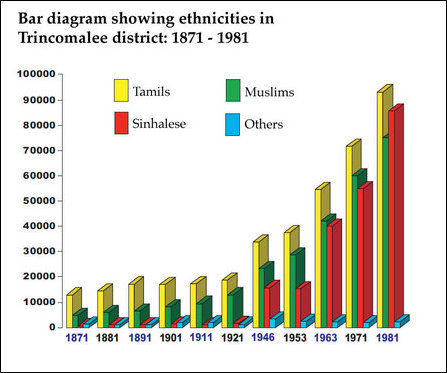Colombo seizes more lands for Sinhala colonisation in Trincomalee through engineering Tamil-Muslim divide in East
The authorities of occupying Colombo are seizing the lands of uprooted Tamils in Uppaa'ru, a GS area in Ki'n'niyaa division located between the East port city of Trincomalee and Moothoor division. There were at least 60 Tamil families and 8 Tamil-speaking Muslim families living in Uppaa'ru village before their displacement during the times of war. The occupying Sri Lanka Army was behind driving the people out from their villages in the late 1990s during the regime of Chandrika Bandaranaike Kumaratunge. The SL military was sustaining around 10 Sinhala colonisers in a nearby locality known as Gengasasara-thoaddam. Now, setting encroaching Muslims against uprooted Tamils, the SL authorities are trying to ‘legally’ seize the lands that belonged to Tamils.
Tamil families owned lands at the rate of 80 to 160 perches per family in the past.
Now, the SL authorities are tying to reduce their ownership to just 10 perches per family to make way for Sinhala colonisation.
Despite their ownership to the lands, the uprooted Tamil families have been systematically deprived of infrastructure and livelihood support, unable to commence a proper resettlement.
In the meantime, colonising and encroaching families of other communities have been provided with humanitarian assistance and other infrastructure facilities. The racial inequality is systemic, the Tamil villagers complain.
While the houses, wells and other housing and other infrastructures of Tamil villagers remain in ruins even 10 years after the end of war in the East, a government Tamil school which was functioning earlier in the division has been converted into a Muslim school by the influence of Muslim politicians.
But, Tamil politicians representing Trincomalee, particularly ‘Opposition’ Leader R. Sampanthan, have totally failed to secure even the ownership rights to the lands despite repeated requests to all parliamentarians representing Trincomalee, the uprooted Uppaa'ru villagers said.
The occupying Sri Lankan army has created and sustained many Sinhala colonies in several parts of the predominantly Tamil eastern province, particularly in the Trincomalee district, since 1983 by driving out Tamils from their traditional villages in those areas.
Sinhala colonisation started to threaten the Tamil-speaking district of Trincomalee after the World War II when the British left the island ensuring their inroad to Trincomalee harbour.
The Article 1 of the Defence Agreement entered between the UK Government and the Government of Ceylon, signed on 04 February 1948 when Ceylon was granted ‘independence’, said: “The Government of the United Kingdom and the Government of Ceylon will give to each other such military assistance for the security of their territories, for defence against external aggression and for the protection of essential communications as it may be in their mutual interest to provide. The Government of the United Kingdom may base such naval and air forces and maintain such land forces in Ceylon as may be required for these purposes, and as may be mutually agreed.”
The Article 2 of the agreement specifies it further with specific mention of access to naval and air bases, ports, military establishments and telecommunication facilities: “The Government of Ceylon will grant to the Government of the United Kingdom all the necessary facilities for the objects mentioned in Article I as may be mutually agreed. These facilities will include the use of naval and air bases and ports and military establishments and the use of telecommunication facilities, and the right of service courts and authorities to exercise such control and jurisdiction over members of the said forces as they exercise at present.”
From that day today, the engineering aimed at demographic change in the district has continued with military and sophisticated administrative schemes of the genocidal unitary State mechanism, which is being upheld by the foreign powers seeking inroads into the island since the colonial era, commented Tamil political observers in Trincomalee.
The US military is currently engaged in military-to-military exercises in the city of Tricomalee, the occupied capital of the country of Eezham Tamils.
Related Articles:

கருத்துகள் இல்லை:
கருத்துரையிடுக